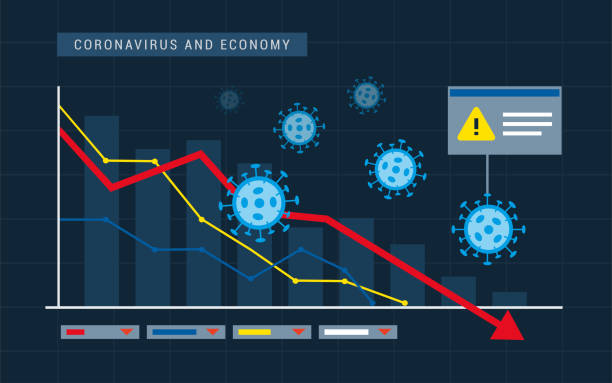The Coronavirus Pandemic: Unveiling a Global Crisis
The world stood still as a microscopic foe wreaked havoc across the globe - the coronavirus pandemic, an unprecedented crisis that shook every facet of human life. In the wake of COVID-19's emergence, the world witnessed the convergence of science, politics, economics, and human behavior on an unparalleled scale. The pandemic's multifaceted impact, from the overwhelming healthcare systems to the dramatic societal shifts, serves as a stark reminder of humanity's vulnerability and resilience in the face of adversity.
The coronavirus, scientifically named SARS-CoV-2, surfaced in late 2019 in the city of Wuhan, China. Rapidly spreading to other parts of the world, the virus triggered a global health emergency that led the World Health Organization (WHO) to officially declare a pandemic on March 11, 2020. The ensuing months witnessed governments grappling to contain the virus's spread, employing a variety of measures ranging from lockdowns and travel restrictions to mask mandates and social distancing guidelines.
The pandemic exposed the strengths and weaknesses of healthcare systems worldwide. Hospitals became battlegrounds, with healthcare workers fighting tirelessly against a relentless enemy. In many places, shortages of personal protective equipment (PPE), ventilators, and medical supplies underscored the unpreparedness of even advanced healthcare systems. The pandemic's impact extended beyond COVID-19 patients, as routine medical procedures were delayed, mental health issues surged, and disparities in healthcare access were glaringly illuminated.
The socioeconomic fallout of the pandemic was profound. Businesses shuttered as economies nosedived, leaving millions unemployed and pushing many into poverty. Governments rolled out massive stimulus packages to stave off economic collapse, but the road to recovery remained arduous. The pandemic expedited the shift towards remote work and digital services, fundamentally altering the way societies functioned. E-learning became the norm, transforming education and highlighting the digital divide that marginalized many students.
The pandemic's effects also rippled through the political landscape. Leaders faced a colossal challenge in balancing public health with civil liberties. Debates over the effectiveness of various containment measures and the speed of vaccine distribution often turned political, exposing the polarization that had already gripped many societies. International cooperation, a necessity in combating a global crisis, sometimes faltered as countries competed for limited resources.
Science and innovation emerged as beacons of hope. The rapid development of vaccines, a testament to human ingenuity, marked a pivotal moment in the pandemic's trajectory. Within a remarkably short period, multiple vaccines were authorized for emergency use, offering a lifeline for vulnerable populations. However, the global distribution of vaccines unveiled another crisis - vaccine nationalism and inequity. While some countries secured ample doses, others struggled to inoculate even a fraction of their populations.
As societies transitioned from crisis mode to long-term adaptation, the pandemic's enduring impact on human behavior became evident. Hygiene practices evolved, remote work normalized, and digital interactions replaced in-person gatherings. The psychological toll of prolonged uncertainty and isolation prompted discussions about mental health's significance, fostering a greater awareness of the importance of well-being.
The pandemic also acted as a magnifying glass, amplifying existing inequalities. Vulnerable communities, including the elderly, racial minorities, and low-income individuals, bore the brunt of the virus's impact. The crisis underscored the imperative for more inclusive and equitable societal structures, urging governments and organizations to address systemic disparities systematically.
Looking forward, the lessons gleaned from the pandemic are invaluable. Preparedness for future health crises demands a global commitment to bolstering healthcare infrastructure and scientific research. The pandemic highlighted the urgency of addressing climate change, as zoonotic diseases like COVID-19 are exacerbated by environmental degradation. Additionally, international collaboration and equitable vaccine distribution remain critical to prevent future health disparities.
The coronavirus pandemic's indelible mark will resonate for generations. It forced humanity to confront its fragility and adapt to new realities swiftly. Through the chaos emerged tales of heroism, unity, and innovation. Neighbors supported each other, scientists raced against the clock, and nations found common ground in an extraordinary challenge. As the world rebuilds and recovers, the memory of this crisis will serve as a testament to human endurance, reminding us that even in the darkest of times, the light of resilience and hope shines through.
The world stood still as a microscopic foe wreaked havoc across the globe - the coronavirus pandemic, an unprecedented crisis that shook every facet of human life. In the wake of COVID-19's emergence, the world witnessed the convergence of science, politics, economics, and human behavior on an unparalleled scale. The pandemic's multifaceted impact, from the overwhelming healthcare systems to the dramatic societal shifts, serves as a stark reminder of humanity's vulnerability and resilience in the face of adversity.
The coronavirus, scientifically named SARS-CoV-2, surfaced in late 2019 in the city of Wuhan, China. Rapidly spreading to other parts of the world, the virus triggered a global health emergency that led the World Health Organization (WHO) to officially declare a pandemic on March 11, 2020. The ensuing months witnessed governments grappling to contain the virus's spread, employing a variety of measures ranging from lockdowns and travel restrictions to mask mandates and social distancing guidelines.
The pandemic exposed the strengths and weaknesses of healthcare systems worldwide. Hospitals became battlegrounds, with healthcare workers fighting tirelessly against a relentless enemy. In many places, shortages of personal protective equipment (PPE), ventilators, and medical supplies underscored the unpreparedness of even advanced healthcare systems. The pandemic's impact extended beyond COVID-19 patients, as routine medical procedures were delayed, mental health issues surged, and disparities in healthcare access were glaringly illuminated.
The socioeconomic fallout of the pandemic was profound. Businesses shuttered as economies nosedived, leaving millions unemployed and pushing many into poverty. Governments rolled out massive stimulus packages to stave off economic collapse, but the road to recovery remained arduous. The pandemic expedited the shift towards remote work and digital services, fundamentally altering the way societies functioned. E-learning became the norm, transforming education and highlighting the digital divide that marginalized many students.
The pandemic's effects also rippled through the political landscape. Leaders faced a colossal challenge in balancing public health with civil liberties. Debates over the effectiveness of various containment measures and the speed of vaccine distribution often turned political, exposing the polarization that had already gripped many societies. International cooperation, a necessity in combating a global crisis, sometimes faltered as countries competed for limited resources.
Science and innovation emerged as beacons of hope. The rapid development of vaccines, a testament to human ingenuity, marked a pivotal moment in the pandemic's trajectory. Within a remarkably short period, multiple vaccines were authorized for emergency use, offering a lifeline for vulnerable populations. However, the global distribution of vaccines unveiled another crisis - vaccine nationalism and inequity. While some countries secured ample doses, others struggled to inoculate even a fraction of their populations.
As societies transitioned from crisis mode to long-term adaptation, the pandemic's enduring impact on human behavior became evident. Hygiene practices evolved, remote work normalized, and digital interactions replaced in-person gatherings. The psychological toll of prolonged uncertainty and isolation prompted discussions about mental health's significance, fostering a greater awareness of the importance of well-being.
The pandemic also acted as a magnifying glass, amplifying existing inequalities. Vulnerable communities, including the elderly, racial minorities, and low-income individuals, bore the brunt of the virus's impact. The crisis underscored the imperative for more inclusive and equitable societal structures, urging governments and organizations to address systemic disparities systematically.
Looking forward, the lessons gleaned from the pandemic are invaluable. Preparedness for future health crises demands a global commitment to bolstering healthcare infrastructure and scientific research. The pandemic highlighted the urgency of addressing climate change, as zoonotic diseases like COVID-19 are exacerbated by environmental degradation. Additionally, international collaboration and equitable vaccine distribution remain critical to prevent future health disparities.
The coronavirus pandemic's indelible mark will resonate for generations. It forced humanity to confront its fragility and adapt to new realities swiftly. Through the chaos emerged tales of heroism, unity, and innovation. Neighbors supported each other, scientists raced against the clock, and nations found common ground in an extraordinary challenge. As the world rebuilds and recovers, the memory of this crisis will serve as a testament to human endurance, reminding us that even in the darkest of times, the light of resilience and hope shines through.




